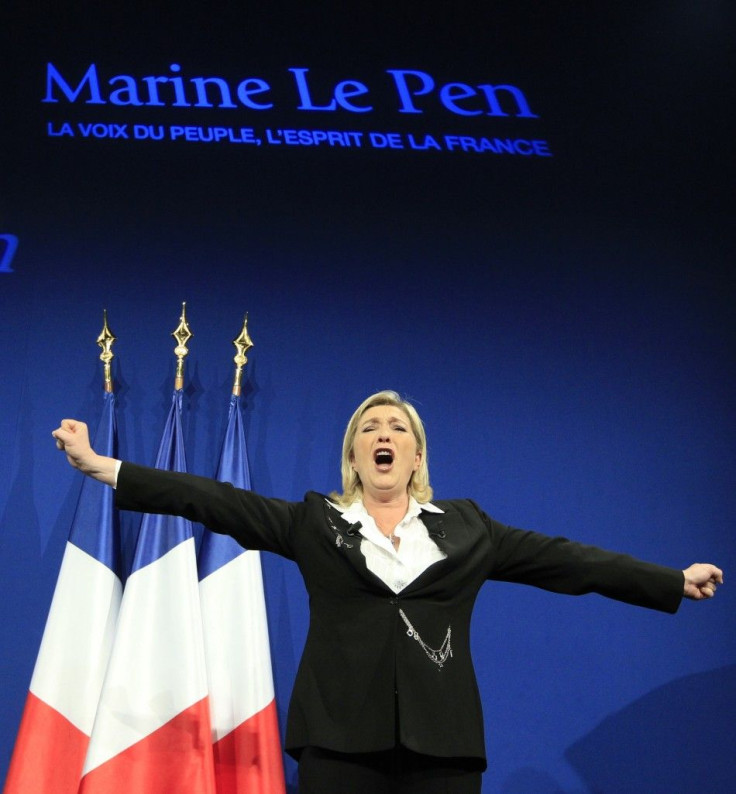Marine Le Pen: France’s Extreme Right Gains A Hollow ‘Victory’

Marine Le Pen of France’s extreme right-wing National Front (FN) party has just enjoyed her second electoral success, after her first strong showing in the presidential elections of 2012. In mayoral polls over the weekend, the anti-immigration, anti-European Union FN took control of about at least a dozen municipalities, and gained some 1,500 seats in local councils, leading Le Pen to boast that her party has become an important player and kingmaker in French politics.
But in both of these cases (2012 and 2014), the word success has to be understood in the negative sense. A National Front victory is mainly a question of defeat for the two mainstream parties: the ruling Socialists of President Francois Hollande and the center-right Union for a Popular Movement (UMP).
When things go bad in France, it is said, the FN does well. Consider the factors in the municipal elections: like the low turnout (something like 39 percent eligible voters stayed away from the polls). Voter abstention was at a record high, in both the first and second rounds. The failure of Socialist supporters to even bother to cast ballots resulted in the Socialist Party losing 151 of the big cities, that is, those with over 10,000 inhabitants. How bad is that? This means that the Socialists lost their majority in local governments across France, which the party had slowly reconstructed during their long decade out of power.
Not only did this transform the opposition UMP into the holder of a majority of local municipalities (which can give them, in the long term, control of other institutions, like the indirectly elected French Senate), but the Socialists' defeat in the municipal elections also handed over 10 big cities to the FN. This was heralded as the “victory” for the FN since they had no mayors before this election. But consider that the UMP now has 320 city mayors, and the Socialists still have 210. So, what is meant as a “victory” for FN is surely something different from what the word means to the two major parties.
Marine Le Pen has been on television a lot since the defeat of the Socialists, and her focus and rhetoric reveals the true nature of this electoral “victory.” First, she is focusing on the upcoming European parliamentary elections in May -- and Europe has long served as a whipping boy for the FN. Already her party was polling stronger in European elections than either of the two main government parties, and Le Pen now hopes to capitalize on a wave effect from the municipals. But if the municipal elections were sufficiently important, she would not have to keep campaigning and could rest on her laurels. So her television discourses underscore that this has been a partial victory for her party.
Second, she is targeting all her venom upon Manuel Valls, who is going to replace Jean-Marc Ayrault in the coming days. Rather than focusing on the center-right UMP, which is going through a leadership crisis ever since former President Nicolas Sarkozy was voted out of office in 2012, she is focusing on Valls, who is actually on the right-wing end of the Socialist party. Why? Because he alienates not only the left-wing Socialists, but also the Socialists' allies on the left, like the Greens, because he is relatively conservative. The choice of Valls for prime minister was no surprise, given his burning ambition, and numerous declarations that he wanted the post. But if Hollande wants to send a symbolic message that he understood the voters in the municipal elections, the message should be that he is willing to move to the right of the political spectrum. Le Pen is therefore protecting her own territory, and lashing out against Valls. She has also been violently attacking his performance as interior minister and what she claims are his failures to control illegal immigration.
Alas, immigration remains the Sword of Damocles for the FN -- Le Pen promises to slice the Gordian knot of recession, trade deficit, debt and structural reforms all by fighting illegal immigration. She also continues to focus on the “evils” of the euro currency, which she holds responsible for many of France's trade problems. These two issues may resonate well with the French, who, at any rate, seem largely uninterested in European elections (on this basis, the French are no probably different from any other Europeans).
But keep in mind that as the abstention rate was high for the recent French municipal elections, the abstention rate for European parliamentary elections has been growing every year. The higher the abstention, the worse things get for France; the worse they get for France, the better they get for the National Front.
Does this mean we should expect Le Pen to get elected president of the Republic? No, that is not going to be possible so long as France continues to use a double-ballot majority ballot. Even if she were to make it into the second round, as her father, FN founder Jean-Marie, did back in 1995, the so-called "pacte republican" would rally together supporters of the left and right in a common alliance against the FN.
At least, that is what happened last time ...
Douglas Yates, Ph.D., is a political scientist at the American University of Paris (AUP) and the American Graduate School in Paris (AGS).
© Copyright IBTimes 2024. All rights reserved.











